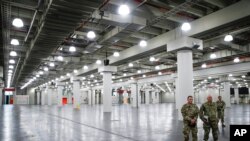The United States could become the global epicenter of the coronavirus outbreak, the World Health Organization said on Tuesday, as Britain went into lockdown and Olympic organizers considered postponing the 2020 Tokyo Games.
But the Chinese province of Hubei, where the virus was first identified in December, said it would lift travel restrictions on people leaving the region as the epidemic there eases.
On the economic side, business activity collapsed from Australia and Japan to Western Europe at a record pace in March, with data for the United States later on Tuesday expected to be just as dire.
"The coronavirus outbreak represents a major external shock to the macro outlook, akin to a large-scale natural disaster," analysts at BlackRock Investment Institute said.
WHO spokeswoman Margaret Harris said in Geneva there had been a "very large acceleration" in coronavirus infections in the United States which had the potential of becoming the new epicenter.
Over the past 24 hours, 85 percent of new cases were from Europe and the United States, she told reporters. Of those, 40 percent were from the United States.
Asked whether the United States could become the new epicenter, Harris said: "We are now seeing a very large acceleration in cases in the U.S. so it does have that potential. We cannot say that is the case yet but it does have that potential."
London lockdown
Some U.S. state and local officials have decried a lack of coordinated federal action, saying having localities act on their own has put them in competition for supplies.
U.S. President Donald Trump acknowledged the difficulty in a tweet.
"The World market for face masks and ventilators is Crazy. We are helping the states to get equipment, but it is not easy," he wrote.
Confirmed coronavirus cases exceeded 377,000 across 194 countries and territories as of early Tuesday, according to a Reuters tally, with over 16,500 deaths linked to the virus.
Of the top 10 countries by case numbers, Italy had reported the highest fatality rate, at around 10%, which is reflective of its older population. The fatality rate globally is around 4.3%.
Britain, believed by experts to be about two weeks behind Italy in the outbreak cycle, woke up on Tuesday to curbs on movement without precedent in peacetime after Prime Minister Boris Johnson ordered the country to stay at home.
The streets of the capital were eerily quiet as all but essential shops closed and people only went to work if it was essential.
Johnson had resisted pressure to impose a full lockdown even as other European countries had done so, but was forced to change tack as projections showed the health system could become overwhelmed.
Olympics under threat
A decision on whether to postpone this year's Tokyo Olympics for the first time will come in days, sources said on Tuesday.
The July 24-Aug. 9 Olympics have been the last major sporting event left untouched as the epidemic put most of the world in virtual lockdown.
The International Olympic Committee and Japan repeated their insistence that the event would go ahead as scheduled — and then their weekend announcement of a lengthy, one-month consultation over possible postponement — perplexed many.
Japanese Prime Minister Shinzo Abe and IOC President Thomas Bach were to talk by phone on Tuesday.
China's Hubei province, the original epicenter of the outbreak, will lift travel curbs on people leaving the area, but other regions will tighten controls as new cases double due to imported infections.
The provincial capital Wuhan, which has been in total lockdown since Jan. 23, will see its travel restrictions lifted on April 8.
However, the risk from overseas infections appears to be on the rise, prompting tougher screening and quarantine measures in major cities such as the capital Beijing.




